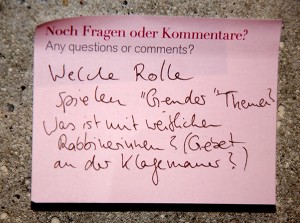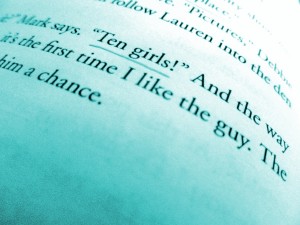“What’s the story with women rabbis? (And prayer at the Western Wall?)”

The question of the month in the special exhibition “The Whole Truth”
© Jewish Museum Berlin, photo: Anina Falasca
Our special exhibition “The Whole Truth… everything you always wanted to know about Jews” is based on 30 questions posed to the Jewish Museum Berlin or its staff over the past few years. In the exhibition, visitors have their own opportunity to ask questions or to leave comments on post-it notes. We answer some of these questions here in our blog.
The question about the roles of men and women in Judaism is interesting because traditional notions about these roles have changed dramatically over the course of the last century. As in every religion, there are also many opinions about this issue among Jews. These correspond with the tendencies of orthodox, conservative, or liberal currents in Judaism, which – while they grapple with the same questions – come to quite different conclusions. → continue reading
 In the past, a number of literary texts on Jewish topics contributed to Jewish culture in various ways. Some documented and revitalized oral history and folk tales in an attempt to save them from oblivion (e.g. Martin Buber’s Tale of the Hasidim); others made Jewish topics palatable to the majority society (e.g. Sidney Taylor’s All-of-a-Kind Family); and still others helped to build a Jewish community around shared experiences of ritual, emigration and persecution (e.g. Friedrich Torberg’s Tante Jolesch or The Decline of the West in Anecdotes).
In the past, a number of literary texts on Jewish topics contributed to Jewish culture in various ways. Some documented and revitalized oral history and folk tales in an attempt to save them from oblivion (e.g. Martin Buber’s Tale of the Hasidim); others made Jewish topics palatable to the majority society (e.g. Sidney Taylor’s All-of-a-Kind Family); and still others helped to build a Jewish community around shared experiences of ritual, emigration and persecution (e.g. Friedrich Torberg’s Tante Jolesch or The Decline of the West in Anecdotes).
Nathan Englander, one of the most sophisticated and provocative current writers, shares none of these intentions. His latest book, What We Talk About When We Talk About Anne Frank, is a collection of eight short stories loosely bound together under the title of (and a quote from) the first story, arising from a heated conversation about genocide; it refers to Anne Frank not as a historical figure, but as a metonym of victimhood. Accordingly, the stories reflect on the effect of Jewish themes, such as religion, the Holocaust and Israel, on modern Jewish identities. The author’s perspective is from within – he was born in 1970 to an Orthodox-Jewish family in New York – and critical. His gripping, intimate theatre-like episodes are fraught with tense dialog questioning the validity of Jewish cultural practice: → continue reading
Maybe I should have fasted, but instead, I was rubbing my injured knee and wrist, picking up my bicycle from the road where I’d fallen.
 On Yom Kippur, the Day of Atonement, one is supposed to reflect on one’s sins over the last year, to apologize to friends and family, to pray and to fast. And as it is the holiest of all Jewish holidays, it is widely respected in Israel, even by atheists. Trains, buses, and airplanes all stop running; shops and restaurants remain closed; even driving a car is taboo. And so, with the streets and highways empty and nothing on the radio or TV, it has become the perfect occasion for those of us who don’t take atonement all that seriously to go out for a bike ride. → continue reading
On Yom Kippur, the Day of Atonement, one is supposed to reflect on one’s sins over the last year, to apologize to friends and family, to pray and to fast. And as it is the holiest of all Jewish holidays, it is widely respected in Israel, even by atheists. Trains, buses, and airplanes all stop running; shops and restaurants remain closed; even driving a car is taboo. And so, with the streets and highways empty and nothing on the radio or TV, it has become the perfect occasion for those of us who don’t take atonement all that seriously to go out for a bike ride. → continue reading


